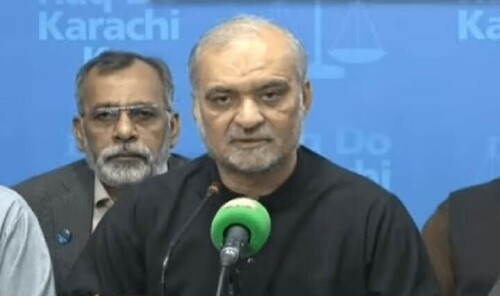KARACHI: The Sindh government is planning to launch a poverty reduction plan in Thatta and Badin districts as a pilot project which will later on be followed in other districts.
In this connection a strategy was prepared with technical assistance of the European Union for targeting poverty reduction through existing government initiatives together with experience and research-based conclusions.
This emerged here on Friday in a meeting held at CM House, where Chief Minister Syed Murad Ali Shah and the ministers concerned were given a presentation on the study report.
This report spread on 215 pages was the outcome of two-year study on the subject by European Union Technical consultant Dr Kaiser Bengali and the planning and development department of the Sindh government.
The study is in addition to the decision taken by the Sindh government last week to carry out a scientific survey by the Bureau of Statistics of the government of Pakistan to assess and measure poverty ratio in the province so that it could be addressed accordingly.
Defining urban and rural poverty in the presentation, according to Dr Bengali, who is an eminent economist, it is stated that urban poverty is characterised by lack of employment and shortage of income. Therefore, focus of the programme is on interventions aimed at improved economic opportunities, targeting enterprise development as a means of enhancing employment opportunities and thus household income levels.
In the second phase urban economic clusters and income enhancement programmes would be launched.
Rural Sindh is characterised by many villages and small settlements dispersed across the province.
In the study report interventions are focused on identification of villages within specified proximity to each other and identify a growth/service hub within the cluster where economies of scale and improvement of services/facilities could be improved through consolidation.
Dr Kaiser Bengali said that the growth/service hub might contain housing and village upgrades by improving internal roads, drains, parks and mosques.
There would be commercial facilities to support local agri-based businesses and services such as input/output storage facilities, distribution centres, sale outlets, banks, refrigerated storage facilities, milk chilling plant and vet clinic.
In the second phase, intervention would focus on creation of rural hub (supply side development) which would have a catalytic effect on promoting economic activities (a demand side development).
The rural hubs hold a catalytic value for poverty reduction through four anticipated mechanisms by creating opportunities for raising household incomes, providing the potential for saving on avoidable household expenditures through improved access to services and facilities, reducing transaction costs and fiscal savings for the government through consolidation of services.
According to Dr Bengali, there are five pillars of implementation of poverty reduction strategy.
They are: programme design and preparation for rollout; institutional and legal; public financial management and accountability; monitoring and evaluation and capacity development and communications.
The chief minister directed chairman of P&D Mohammad Waseem to circulate the study paper among the cabinet members so that it could be discussed and approved as policy in the next cabinet meeting for implementation.
Responding to a question, Dr Bengali told Dawn that earlier NGOs were working in villages in the name of poverty reduction programme on which millions of rupees were spent without any result while Rural Support Programme (RSP) proved successful in mobilising social capital and organising it by forming different committees.
On the basis of the results of the RSP, the study was initiated to formulate an effective strategy for reduction of poverty in the province from rural and urban areas and for this purpose a thorough study was presented to the chief minister.
Published in Dawn, October 13th, 2018













































Dear visitor, the comments section is undergoing an overhaul and will return soon.